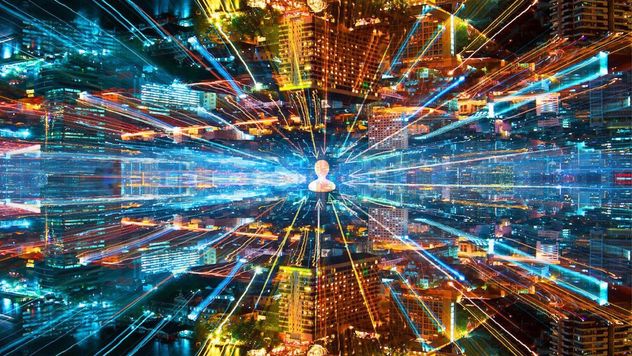
I had the pleasure of being invited by Genesys to be a part of the Toronto Tech Summit’s panel discussion on “How AI is Shaping Society,” late last week. I thoroughly enjoyed the conversation along with my awesome fellow panelists (from IBM, Element.AI, Inegrate.AI and RBC) and the crowd was extremely engaged! In case you missed it, here are some of my answers to the questions posed:
Q: How will Artificial Intelligence change the way we interact with each other? Now that we’ve seen the new Google Duplex (and Microsoft Xiaoice) and its ability to interact with humans, what does this mean for the future of human-to-human conversation and interaction? Are we going to see this technology as a proxy for talking to people?
“Technopanic” is not a very new concept. When cars were first introduced, people claimed it would lead to the destruction of the concept of “families.” When telephones came in, it was the destruction of “civil conversations,” and with calculators, it was the end of “memorizing.” None of that has really happened. We have evolved our lives and made them more productive if anything else.
Our tech fortune tellers generally have the habit of going overboard with the extremes. With AI transformation, I honestly believe some things will change dramatically, and some will evolve slowly. The drudgery of making phone calls to dispute charges from Telcos, banks or to set up appointments will be a thing of the past with AI technology.
Human-to-human interaction will go from being one dimensional, as we know it today, to a hybrid one where assistive technologies would optimize outcomes. For example, I could very well see Chris (the moderator) using one of the futuristic devices in a crowded fish market in Mumbai haggling over the price of shrimp in the local dialect. I was in the UK a few months back, where one of the billboards read the tagline of a company, “when your heart stops beating we keep tweeting.” Human interaction is going to definitely change, but for the better. It will be more efficient and more productive when you want it, and stays the same when you don’t.

Q: Why does AI have to be explainable or auditable?
There are software companies who create applications that help to better understand if inmates from jails are ready to be paroled. Based on their scores, judges chose to parole them or put them back behind bars. However, as data science and analytics is not completely foolproof a bad decision, however unintentional, could very well equate to years of additional jail time! From what we hear, people of colour are 77% less likely to get bail than others. Just one single KPI, independent of the type of crime they might have committed. Now, this inherent bias has made it to algorithms, and we clearly hope that software is explainable and auditable to essentially undo cases such as these.
Q: What is the longer-term impact of assistive AI technologies?
I have a tendency to look for historical similarities when things happen, and with AI, given the potential magnitude of sweeping changes, we only have a handful of inventions which come close. The direct outcome of assistive tech is that due to higher efficiency and productivity of the bots and AI-powered contraptions, a lot of jobs will be lost. Fortunately, a lot more will be created, and most importantly every job will change. However, the secondary changes are far more difficult to predict. For, eg. When you look at the transition from “Horses” to “Cars” in the early 1920’s, there were three important secondary outcomes, which no one really could have envisioned:

- Since cars went by billboards a lot faster than horses; companies started using logos rather than their full names. A new stream of advertising started, more centred around brand recognition
- Cars were more expensive than typical consumer products, and hence people had to take credit from banks; which had never really happened until then. A new stream of banking called “Consumer Credit” was born
- Globally, 25% of total agriculture land was used to produce hay; used to feed horses. When the population of horses started to reduce, people started growing wheat, leading to a surplus of wheat and a subsequent dramatic drop in prices. As the downstream value chain of farming wheat was highly inelastic – a lot of farmers went bankrupt, and so did the rural banks they were associated with. As rural banks began to collapse, it caused a cascading effect which led to urban banks going out of business and accelerated the slide of the stock market – already in recession – which lead to the Great Depression
For me, the most important point is that we have to be agile, adapt, and evolve. Over 40-years, all goes well, but over the short term, we will have to pivot and pivot quickly when needed, to continue existing and thriving.
Q: Will AI foster cross-cultural relationships that are unencumbered by language barriers or will AI take the world in a darker direction?
Absolutely. We are going to be spoilt for choices of tools to break through language and cultural barriers. We are hopefully going to find ways to verbalize what’s in front of the visually impaired, and we are going to find means to fight cancer or diagnose it at a much earlier stage and solve the problem. Life is going to get a lot easier in a lot of different ways, and it will also lead to a bunch of different paradoxes fuelled by AI.

We are going to get lazier but healthier…get dumber but more productive…hyper-capable but helpless…and there are murmurs of the world going into darker spaces too. I wouldn’t say that’s not outside the realm of possibility. However, it’s not as extreme as they make it out to be in The Terminator series or other such sci-fi movies. If you have to take it to an extreme and talk about what would happen when one creates super intelligent machines beyond general AI, then it’s possible that they would think of us as we think of ants today. We don’t want to harm them, in fact when we see them, we try and avoid them by sidestepping them. However, when their objectives and goals are not aligned with ours, we don’t think twice before annihilating them. That is definitely a possibility, but I believe we will never get there, and this is why.
In years from now, what do you think will happen even if there are rumours of a company from the bay area coming close to cracking the code on super-intelligent AI. How do you think other superpowers would retaliate? This is a scenario where winner takes all. A six months lead equates to possibly 500,000 times more productivity in this domain, once the end product is ready. Could it lead to the 3rd World War? Perhaps.
Q: What is the most promising application of AI recently that has the potential to positively impact society? It could be on a business, individual, or social level?
In the 1600’s Louis XVth apparently loved his food. So much so that he had 500 people source vegetables and fruits from around the world. Fast forward to the 21st century and “commoners” like you and I have access to a better variety and quality of food items from Loblaws and other grocery stores. All this thanks to Louis XVth himself; not to mention globalization, better supply chain, etc.
Likewise, today we have to be geographically located in a developed country to get access to the best doctors in the world. However, because of AI and mobile devices, the democratization of the best healthcare diagnosis and medical assistance to remote communities will happen over the next 2-3 decades; something that 30-40% of the world doesn’t have today. It’s going to have a far-reaching beneficial impact on millions of lives!
Q: Name one type of AI application which will fail?
Well, great companies with bad management fail, and sometimes vice versa happens too. Its hard to put a finger on what will succeed and what may not; however, Cambridge Analytics did go out of business, so there you go.
Wondering if your business is a candidate for an AI acceleration? Let’s Connect and discover the possibilities of how AI can transform your business.



